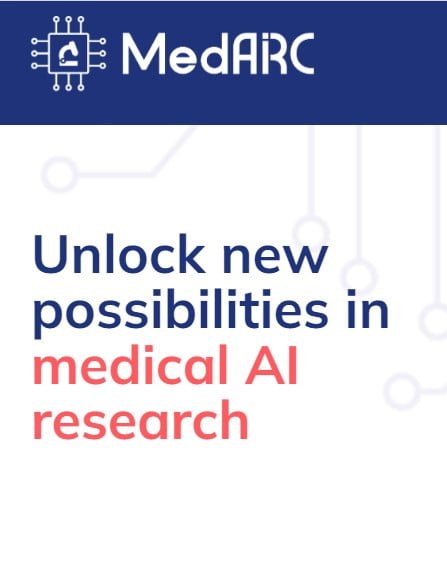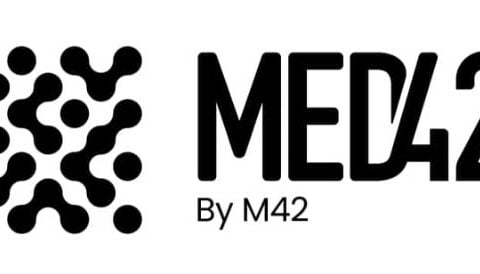Last Updated on March 13, 2024 10:06 am by Laszlo Szabo / NowadAIs | Published on March 13, 2024 by Juhasz “the Mage” Gabor
MedArc: AI Models & Tools for Medical Research – Key Notes
- Medarc, a pioneer in medical AI, aims to revolutionize healthcare with open, collaborative research.
- Founded by Dr. Tanishq Mathew Abraham, it develops large-scale AI foundation models for medicine.
- Focuses on projects like real-time visual perception reconstruction from fMRI and Radiology Foundation Models, including the RoentGen and CheXagent.
- Key team members include Dr. Griffin Adams (Clinical NLP) and Dr. Paul Scotti (Neuroimaging + AI).
- Forms strategic partnerships for broader access to cutting-edge resources and expertise.
Introduction
In the rapidly advancing field of medical AI research, Medarc has risen as a pioneering organization dedicated to unlocking new possibilities. With a vision to build a public community for contributions and develop foundation models for medical AI research, Medarc aims to revolutionize healthcare through innovative solutions.
The Vision of Medarc
Founded a year ago by Dr. Tanishq Mathew Abraham, Medarc was established with a novel, open, and collaborative approach to medical AI research. The organization’s primary goal is to develop large-scale AI foundation models for medicine and build interdisciplinary teams to address clinical needs. With a special interest in applying the latest advances in generative AI to medical applications, Medarc is committed to making significant progress in the field.
Medarc’s Approach to Medical AI Research
Medarc’s approach to medical AI research is driven by the belief that collaboration and transparency are key catalysts for progress. By partnering with researchers, medical professionals, and other stakeholders, Medarc aims to design and launch projects that create large-scale AI models for medicine. The organization is dedicated to sharing models, datasets, and results while establishing best practices for reproducibility and transparency. Medarc also aims to guide public policies around AI development in medicine.
Featured Projects
Medarc has initiated and completed several impactful research projects in the past year. These projects showcase the organization’s expertise and commitment to advancing medical AI research. Let’s explore two of their notable projects:
Real-time Reconstructions of Visual Perception from fMRI
Led by Dr. Paul Scotti, Medarc’s neuroAI research is at the forefront of reconstructing visual perception from human brain activations. Collaborating with leading institutions such as Princeton University, ENS Paris, and the University of Minnesota, Medarc has developed a state-of-the-art fMRI-to-image reconstruction pipeline called MindEye. This pipeline accurately reconstructs the image a subject was looking at based on fMRI scans. Medarc leveraged recent advances in image representations and generation to achieve superior results. They are currently working on improving the reconstruction quality and developing foundation models for fMRI data.
Radiology Foundation Models
Medarc has also made significant contributions to the field of radiology. Through collaborations with Stanford Center for Artificial Intelligence in Medicine & Imaging (AIMI), Medarc has helped develop state-of-the-art foundation models for radiology. One of their notable projects, RoentGen, is a version of Stable Diffusion fine-tuned on chest X-rays. This work demonstrated the benefits of data generated by a Stable Diffusion model for improving downstream model performance. Medarc has also contributed to the development of CheXagent, an 8B vision-language model for radiology, which outperforms previous foundation models on various chest X-ray interpretation tasks.
Medarc’s Team of Experts
Leading Medarc’s mission to revolutionize medical AI research is a team of experts with diverse backgrounds and expertise. Let’s meet some of the key members driving Medarc’s success:
Dr. Tanishq Mathew Abraham – Chief Executive Officer
Dr. Tanishq Mathew Abraham, the founder of Medarc, is a visionary leader dedicated to advancing medical AI research. With a deep understanding of the field and a passion for collaboration, Dr. Abraham has led Medarc’s growth and strategic direction.
Dr. Griffin Adams – Head of Clinical NLP
As the Head of Clinical NLP, Dr. Griffin Adams brings invaluable expertise to Medarc’s efforts in training state-of-the-art language models for the medical domain. Dr. Adams is passionate about transparency and plans to share model weights, methodology, and results to drive progress in the field.
Dr. Paul Scotti – Head of Neuroimaging + AI
Dr. Paul Scotti leads Medarc’s neuroimaging + AI efforts, spearheading projects that combine neuroscience and AI research. With his experience and collaborations with leading institutions, Dr. Scotti has propelled Medarc to the forefront of neuroAI research.
Partnerships for Success
Medarc recognizes the importance of partnerships in achieving its research agenda. The organization has formed strategic alliances with Answer.AI, Princeton University, and the VALID AI initiative. These partnerships enable Medarc to access cutting-edge resources, expertise, and collaborative opportunities necessary to push the boundaries of medical AI research.
Conclusion
Medarc’s commitment to open and collaborative medical AI research has positioned them as a leading force in the field. With groundbreaking projects, a team of experts, and strategic partnerships, Medarc is unlocking new possibilities in healthcare. As they continue to make advancements and share their research with the public, Medarc is poised to shape the future of medical AI and improve patient outcomes.
Definitions
- Medarc: A pioneering organization in medical AI research aiming to develop AI foundation models and promote open collaboration to improve healthcare outcomes.
- fMRI: Functional Magnetic Resonance Imaging, a neuroimaging procedure using MRI technology to measure brain activity by detecting changes associated with blood flow.
- Chest X-ray: A radiography test that produces images of the chest and the organs and structures located in the chest area, commonly used to diagnose conditions affecting the chest.
- Large-scale AI foundation models: AI models trained on vast datasets that provide a broad understanding of the world, adaptable to specific tasks or domains with additional fine-tuning.
- Neuroimaging: The use of various techniques to either directly or indirectly image the structure, function, or pharmacology of the nervous system.
Frequently Asked Questions
- What is Medarc’s primary goal in medical AI research?
- Medarc aims to develop large-scale AI foundation models to address clinical needs and advance healthcare through innovative, open collaborative research.
- How is Medarc advancing neuroimaging with AI?
- Through projects like MindEye, Medarc is at the forefront of reconstructing visual perception from fMRI data, enhancing our understanding of brain function.
- What significant contributions has Medarc made in radiology?
- Medarc contributed to radiology by developing models like RoentGen and CheXagent, improving chest X-ray interpretation with AI.
- Who leads Medarc and what drives their mission?
- Dr. Tanishq Mathew Abraham leads Medarc, driven by a vision for open, collaborative medical AI research to transform healthcare.
- What makes Medarc stand out in the medical AI field?
- Medarc’s commitment to transparency, collaboration, and sharing models and data sets it apart, fostering progress in medical AI.












